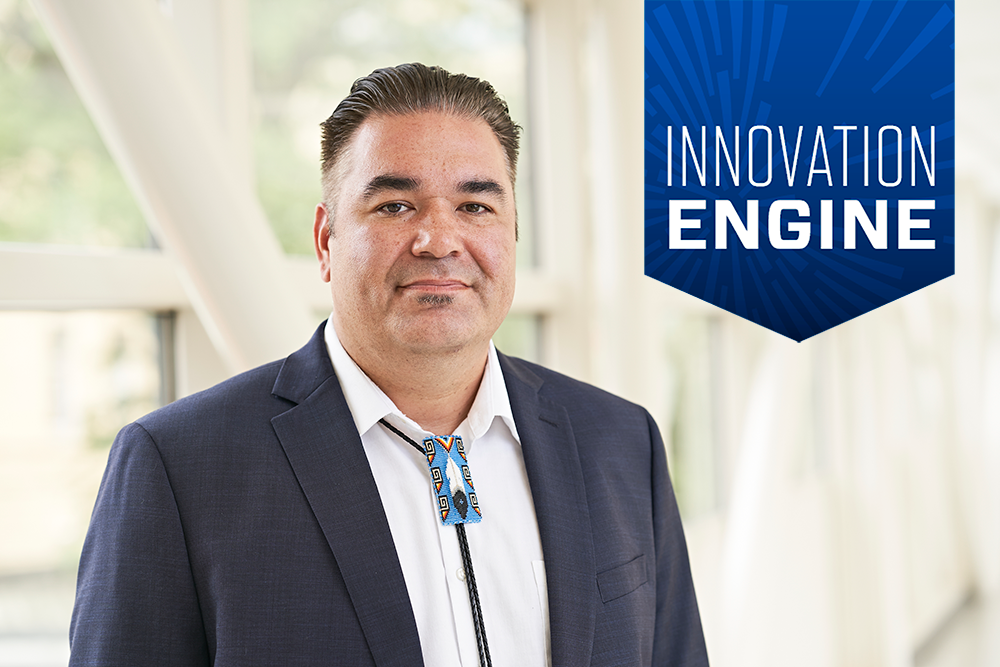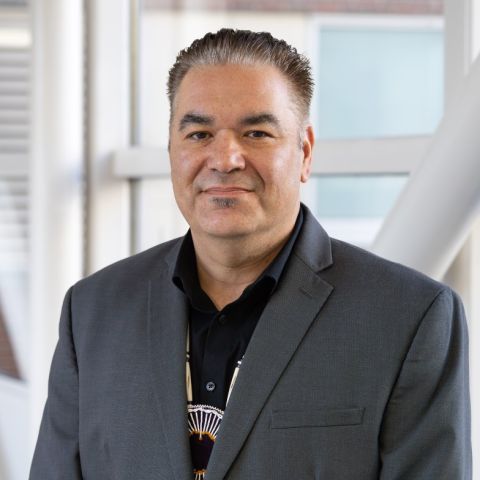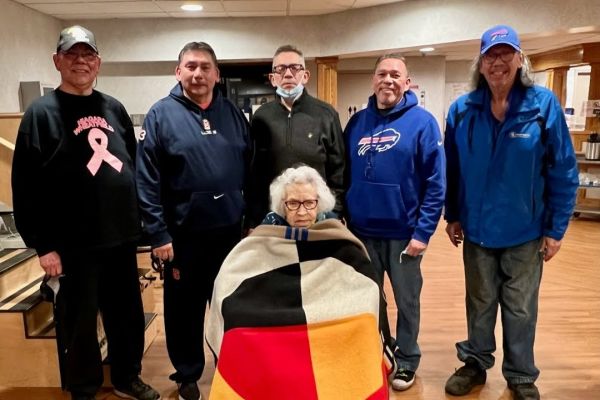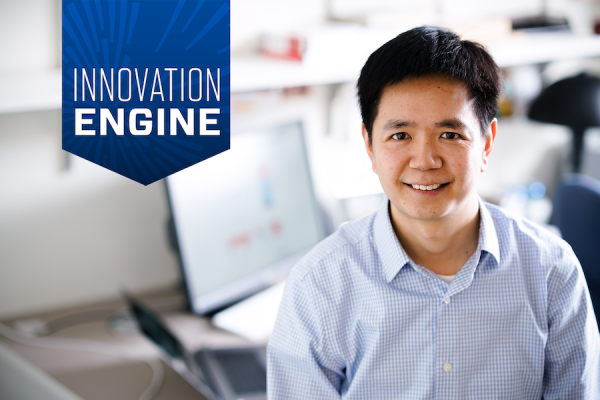Unique program tackles roots of healthcare disparities with education and screening initiatives, patient navigators and internships to bring Indigenous youth into science and oncology fields.
The Innovation Engine series highlights high-impact Roswell Park science that advances the priorities of the National Cancer Plan — a roadmap for working together to end cancer as we know it. The work outlined in this post supports Goal 4: Eliminate Inequities, Goal 6: Engage Every Person, and Goal 8: Optimize Workforce.
For centuries, the Seventh Generation Principle has guided the Haudenosaunee people, who represent six Native American Nations in New York State and the Canadian provinces of Ontario and Quebec. The idea is simple but far-reaching: Before a decision is made, leaders must consider its potential impact on the next seven generations. “That’s the premise behind all our work,” says Rodney Haring, PhD, MSW, Chair of the Department of Indigenous Cancer Health at Roswell Park Comprehensive Cancer Center.
“It’s not enough to advance cancer science through research,” he adds. “To be impactful in a meaningful and lasting way, your research and scientific initiatives have to be intentionally integrated with services and educational outreach to the communities you serve. That’s one of the hallmarks of our Indigenous Cancer Health program at Roswell Park, and I think it’s a key to ensuring benefits for the generations to come.”
Under his leadership, Roswell Park is taking steps to safeguard the health of future generations of Indigenous people by tackling the roots of healthcare disparities in their communities. That goal has led to the creation of the largest Indigenous patient navigation program at any National Cancer Institute-designated Cancer Center and the launch of a partnership that prepares Indigenous youth to become leaders in cancer healthcare and research.
Navigators help reduce barriers to cancer care
The Indigenous & Rural Patient Navigation program recognizes that Native people often run into roadblocks when seeking cancer screening and care. “For people in some communities, travel is one of the biggest barriers,” explains Dr. Haring. “Some of our reservations are far from the nearest cancer center. Patients may even need to travel internationally to access services.” That’s true for residents of the Akwesasne Mohawk community, which straddles the U.S.-Canada border between northern New York State and southern Ontario.
People who live in rural areas or on reservations — or reserves, as they're called in Canada — may also experience culture shock when seeking care at a large medical center, especially in a city, he adds. A language barrier can increase their anxiety, which happens when providers serving near Akwesasne communities use medical forms written in French but not English or Mohawk.
To help relieve that anxiety, program navigators work on both sides of the border, sometimes within Indian Health Service clinics, collaborating with nurses and physicians to answer questions, promote cancer screening and connect patients to the care they need — in a language they understand and with culturally appropriate processes.
Dr. Haring notes that all navigators have completed a year of specialized training. “They learned about cancer and cancer health disparities in Indian country. They were trained in cancer prevention, screening and treatment, and in understanding both Indigenous and Western science policies and concepts. They educate people about what their health journey will look like, comfort and encourage them and provide social support.”
The program’s success has attracted attention nationally and internationally. On several occasions White House officials have contacted Roswell Park for information to be shared with other cancer centers. Earlier this year, Dr. Haring presented an invited talk at the World Indigenous Cancer Conference in Australia about ways to overcome cancer health disparities among Indigenous Peoples worldwide.
Addressing Indigenous health disparities
Roswell Park's Department of Indigenous Cancer Health fuses multidisciplinary expertise and generational knowledge to create a culturally-attuned progression of cancer care — from prevention through survivorship.
Tapping the next generation for science and health-related careers
To ensure that future generations also will benefit from the brightest minds in healthcare and cancer research, Roswell Park serves as scientific partner for The Saint Regis Mohawk Research Scholars Program, administered by the Tribe’s Akwesasne Research Centers for Health (ARCH) and funded with part of a $2.2 million grant from the National Institutes of Health to the Saint Regis Mohawk Tribe.
The program engages Mohawk high school and college students. Juniors at Massena Central High School and the Salmon River schools in upstate New York, along with students from Akwesasne areas in Canada, are eligible for the after-school Mohawk Youth Health Ambassador Program. Haudenosaunee healthcare leaders and Roswell Park researchers introduce them to science- and health-related issues from both the Indigenous and Western perspectives. Students can also apply for three-week paid summer research internships enabling them to work with scientists on Roswell Park’s main campus in Buffalo.
Mohawk college students can apply for paid 10-week summer research internships at Roswell Park that gives them a chance to work closely with investigators whose research interests align with their own. In 2024, the program expanded to more Haudenosaunee Nations, thanks to donations to the Department of Indigenous Cancer Health at Roswell Park raised through the Ride for Roswell and other events.
As a sophomore biology major at Syracuse University, Flint Swamp took part in the program in 2022 and spent the summer investigating cancer-causing contaminants in fish, an important food source for many Mohawk people. Inspired by the hands-on experience, he’ll return to the program this summer with a growing interest in immunology and an eye on becoming a physician.
“A lot of mistrust is present in the Indigenous community regarding research and the medical field in general,” he says. “I want to be able to rebuild that trust. An Indigenous presence brings a level of comfort. Sooner or later I want to return to my community to help them in ways I’m unable to now.”
The college research program transformed the future for Jake Maresca, RN, BSN, who entered the summer before his senior year at St. Joseph’s University. “It changed everything,” he says. The opportunity to become involved in research added a new dimension to his goal of becoming a nurse. Encouraged by nursing administrators and his mentors in the Department of Indigenous Cancer Health, today he’s pursuing a master’s degree in cancer sciences at Roswell Park, where he also serves as a research nurse, caring for patients enrolled in clinical trials.
Maresca grew up on Long Island, relatively distant from his Haudenosaunee community, and the program helped him reconnect with his roots. “It was an incredible opportunity to work with people from my tribe. I would like to bring my research and nursing skills into the Native community,” he adds. “I also love teaching and mentoring. The internship was a pivotal experience in my life. It inspired me to pursue oncology and research. It also allowed me a means of being involved in mentoring the next generation of Native scientists, which is a really special experience.”




